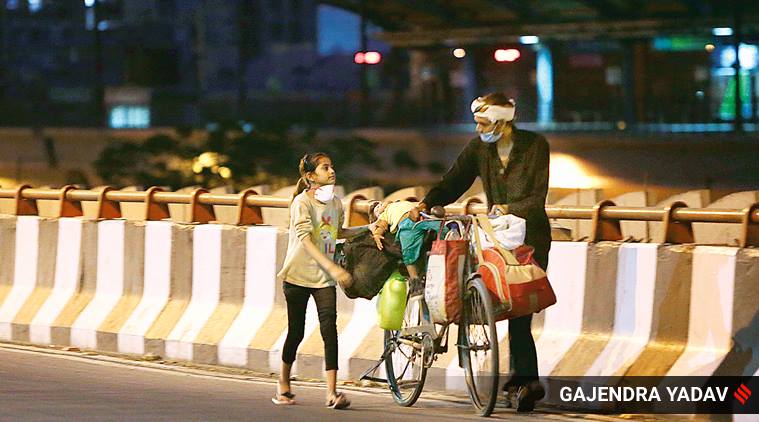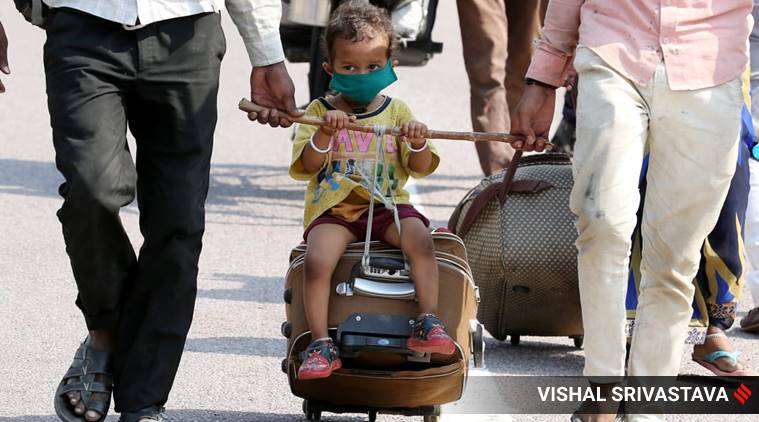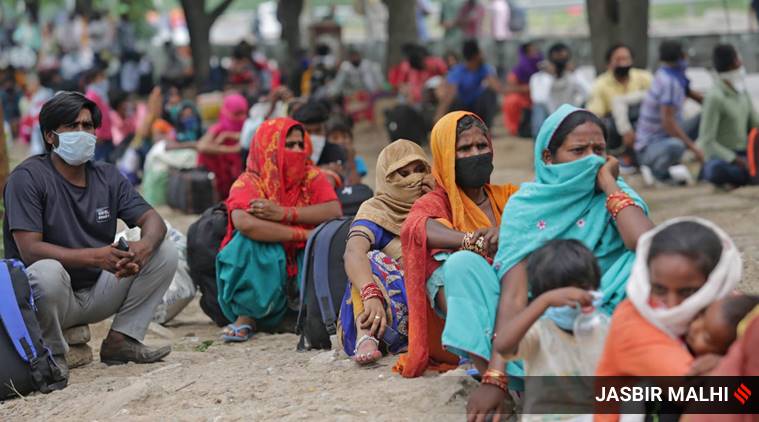Covid economic package: Govt safety net for migrant workers and poor has little for now, more for later
Covid economic package: Govt safety net for migrant workers and poor has little for now, more for later;
Thursday’s measures focused on the poorer segments of society, including migrant labour, small and marginal farmers and urban poor, seems skewed more towards the long-term.
THERE was an expectation that a package aimed at migrant workers, farmers and street vendors would strive to offer immediate relief given that they have borne the brunt of the lockdown-related distress for over 50 days now. But more than half the nine major proposals announced by Union Finance Minister Nirmala Sitharaman on Thursday have a longer-term horizon.
Besides, the second leg of the relief package continues with the basic design of leveraging large stimulus with minimal fiscal cost — of the total liquidity infusion of Rs 3.10 lakh crore, the likely outflow from the Centre’s exchequer is only about Rs 5,000 crore.
Thursday’s measures focused on the poorer segments of society, including migrant labour, small and marginal farmers and urban poor, seems skewed more towards the long-term.
For instance, the affordable rental housing scheme under Pradhan Mantri Awaas Yojana for migrant workers and urban poor will likely be implemented only over a longer time frame. Similarly, the portable ration delivery system is scheduled to be completed only by March next year. The credit facility for street vendors and the extension of the credit-linked subsidy scheme middle class (Rs 6-18 lakh annual income) are also viewed as measures which would take time to be implemented and unlikely to provide any relief in the immediate crisis being faced by workers.
The announcement of free foodgrain supply (5 kg of grains and 1 kg chana per person) for two months to 8 crore migrant workers without a ration card and outside the ambit of National Food Security Act was expected to provide some relief to migrant workers.
READ | FM Nirmala Sitharaman claim of MNREGS spike true only for May, April saw a fall
But experts said this entails resolving complicated logistical issues. Since every public distribution shop has a fixed number of registrants based on which the stock of foodgrains is supplied to the shop, allowing accessibility to non-cardholders may result in shortage of supplies at these outlets.
The other proposal of ‘One Nation One Ration Card’, first announced by Food Minister Ram Vilas Paswan in July last year and then targeted for completion in June 2020, is seen as a system of considerable utility to migrants.
But this too suffers from the limitation of the incomplete value chain backed by infrastructure, including availability of point of sale systems at PDS shops, and states coming on board. Hence, this is unlikely to address the immediate issues being faced by transiting and distressed migrant workers.
Experts said given the ambiguity about differentiating between non-cardholders and cardholders under the ‘One Nation, One Ration Card’ proposal, a worker could possibly take ration from one shop and then identify himself or herself as a non-cardholder in another shop.
READ | No cash in hand for migrants, govt falls back on existing schemes: MNREGS, PDS
“One of the major issues would be how to identify migrant workers and non-migrant workers if the uniform ration card applicability takes place across the country. The administration will face issues about how much stock of foodgrain supplies to send to which shop, given that every shop has a fixed quota, which then could turn into a major logistical problem,” said Pronab Sen, economist and former Chief Statistician of India.
Exclusion of beneficiaries from PDS distribution could possibly be avoided by suspending the ration card system for now and instead relying on Aadhaar for distribution of food grains, Sen said.
The proposal regarding the rollout of affordable rental housing under PMAY by involving the private industry via private public partnership on government land is also unlikely to deliver benefits to quell the short-term distress that is playing out.
“It is not going to happen soon. Also, details about the PPP modalities was not elaborated today and needs to be looked at,” said Partha Chatterjee, Professor and Head of the Economics Department, Shiv Nadar University.
The provision for concessional Rs 2 lakh crore credit to be provided to 2.5 crore farmers, including fishermen, is also contingent on new Kisan Cards being handed out.
Credit facility of Rs 5,000 crore for 50 lakh street vendors will translate into a working capital of only about Rs 10,000 per street vendor for a month.
Analysts said street vendors could have been better served with cash transfers. “The street vendors will be far more disappointed than the migrant workers since they are just getting ‘easy access to credit facility’ and that too only ‘within a month’… Should they not have been given credible forms of income support given they did not and could not sell their wares since March 26? Why could not the government think of instant direct benefit transfer to stranded migrants and the five million street vendors and free ration for the latter if they have not availed it for want of ration card under the Pradhan Mantri Garib Kalyan Yojana?
Why is the government not talking of DBT of a fixed amount of say Rs 5,000 which will, in fact, go back to the business in the form of purchases and then possibly to the government, at least a part of it, as tax?” said K R Shyam Sundar, labour economist and Professor of Human Resources Management at XLRI.


 More than half the nine major proposals announced by Union Finance Minister Nirmala Sitharaman on Thursday have a longer-term horizon.
More than half the nine major proposals announced by Union Finance Minister Nirmala Sitharaman on Thursday have a longer-term horizon. A child travelling on a travel bag with his parents from Ahmedabad to Mau district of Uttar Pradesh.
A child travelling on a travel bag with his parents from Ahmedabad to Mau district of Uttar Pradesh. Migrant labourers with families.
Migrant labourers with families.

No comments